The Role of Consideration in Contract Law: A Comprehensive Analysis
VerifiedAdded on 2023/06/08
|8
|2448
|174
Essay
AI Summary
This essay provides a comprehensive overview of consideration within contract law. It begins by defining consideration as a crucial element for a valid and enforceable contract, emphasizing its role as something of value exchanged between parties. The essay delves into the different types of consideration, including executed and executory consideration, and examines the rules surrounding its adequacy and legality. Key legal cases, such as Currie v Misa and Pinnel's Case, are discussed to illustrate the principles of consideration. Furthermore, the essay addresses the exceptions to the general rules of consideration and explores the doctrine of assumpsit, explaining its historical development and application. The concept of pre-existing duty is analyzed, along with its implications and exceptions, providing a thorough understanding of how contractual obligations are affected. The essay concludes by summarizing the key aspects of consideration and its significance in contract law, providing a clear understanding of its application and relevance.
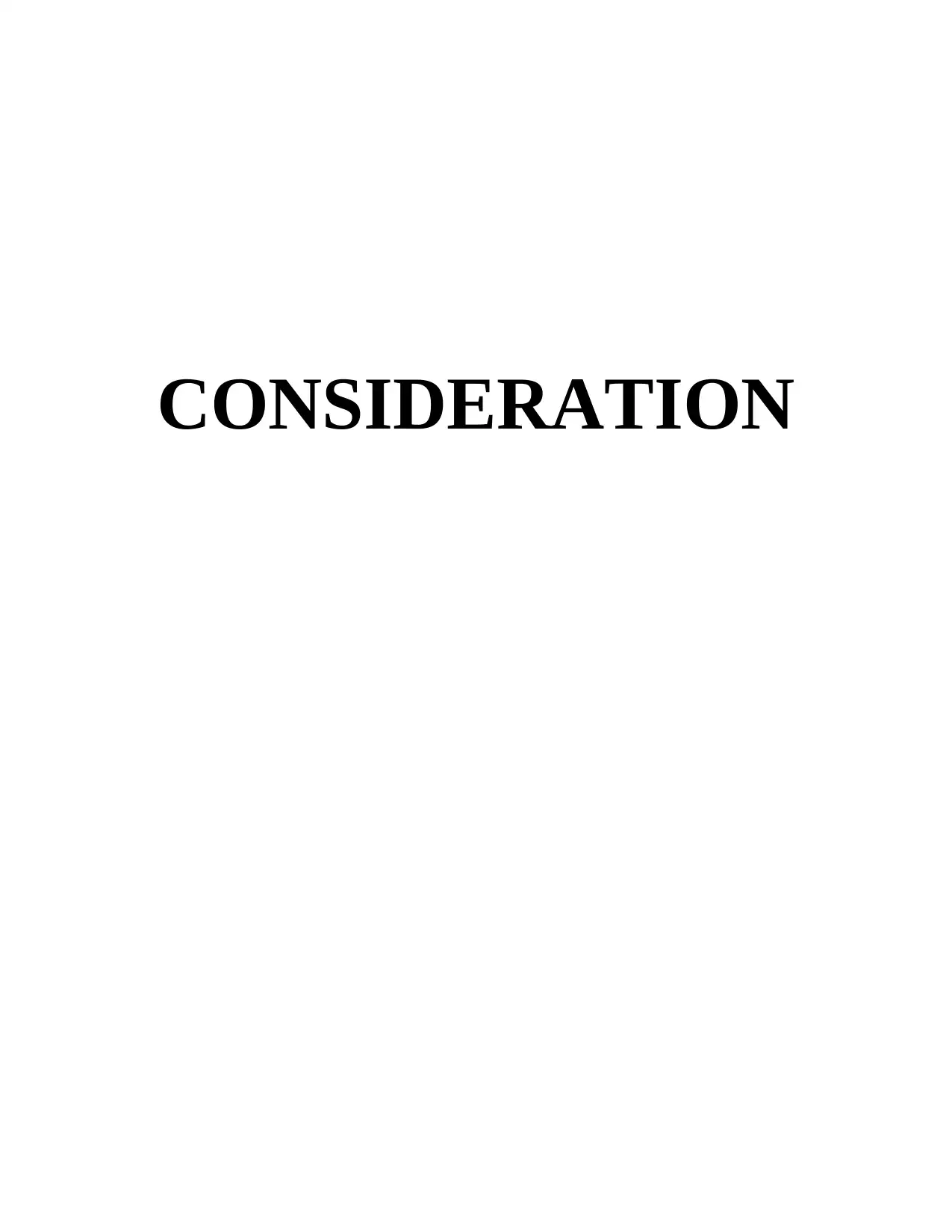
CONSIDERATION
Paraphrase This Document
Need a fresh take? Get an instant paraphrase of this document with our AI Paraphraser

Contents
INTRODUCTION...........................................................................................................................1
MAIN BODY...................................................................................................................................1
CONCLUSION ...............................................................................................................................5
REFERENCES................................................................................................................................5
INTRODUCTION...........................................................................................................................1
MAIN BODY...................................................................................................................................1
CONCLUSION ...............................................................................................................................5
REFERENCES................................................................................................................................5
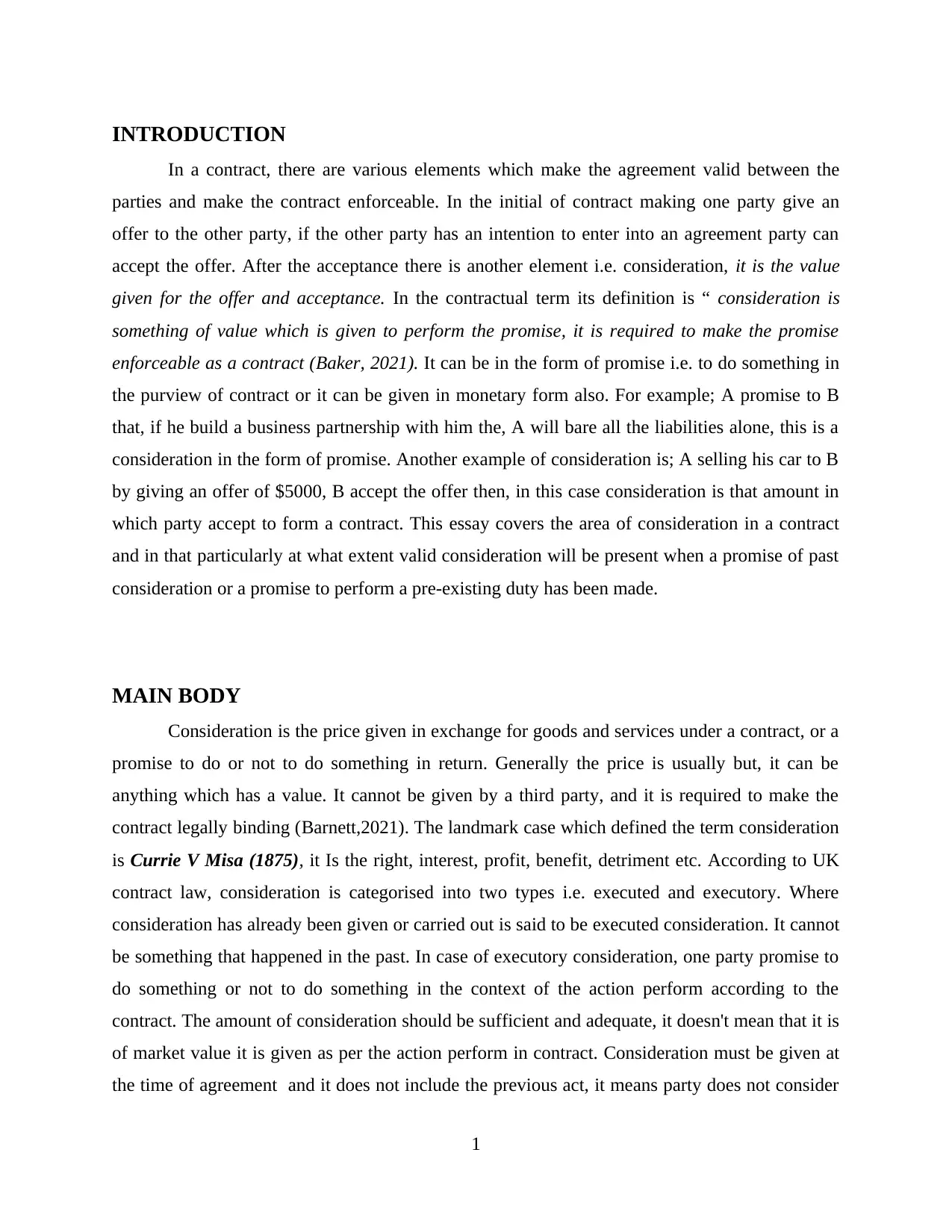
INTRODUCTION
In a contract, there are various elements which make the agreement valid between the
parties and make the contract enforceable. In the initial of contract making one party give an
offer to the other party, if the other party has an intention to enter into an agreement party can
accept the offer. After the acceptance there is another element i.e. consideration, it is the value
given for the offer and acceptance. In the contractual term its definition is “ consideration is
something of value which is given to perform the promise, it is required to make the promise
enforceable as a contract (Baker, 2021). It can be in the form of promise i.e. to do something in
the purview of contract or it can be given in monetary form also. For example; A promise to B
that, if he build a business partnership with him the, A will bare all the liabilities alone, this is a
consideration in the form of promise. Another example of consideration is; A selling his car to B
by giving an offer of $5000, B accept the offer then, in this case consideration is that amount in
which party accept to form a contract. This essay covers the area of consideration in a contract
and in that particularly at what extent valid consideration will be present when a promise of past
consideration or a promise to perform a pre-existing duty has been made.
MAIN BODY
Consideration is the price given in exchange for goods and services under a contract, or a
promise to do or not to do something in return. Generally the price is usually but, it can be
anything which has a value. It cannot be given by a third party, and it is required to make the
contract legally binding (Barnett,2021). The landmark case which defined the term consideration
is Currie V Misa (1875), it Is the right, interest, profit, benefit, detriment etc. According to UK
contract law, consideration is categorised into two types i.e. executed and executory. Where
consideration has already been given or carried out is said to be executed consideration. It cannot
be something that happened in the past. In case of executory consideration, one party promise to
do something or not to do something in the context of the action perform according to the
contract. The amount of consideration should be sufficient and adequate, it doesn't mean that it is
of market value it is given as per the action perform in contract. Consideration must be given at
the time of agreement and it does not include the previous act, it means party does not consider
1
In a contract, there are various elements which make the agreement valid between the
parties and make the contract enforceable. In the initial of contract making one party give an
offer to the other party, if the other party has an intention to enter into an agreement party can
accept the offer. After the acceptance there is another element i.e. consideration, it is the value
given for the offer and acceptance. In the contractual term its definition is “ consideration is
something of value which is given to perform the promise, it is required to make the promise
enforceable as a contract (Baker, 2021). It can be in the form of promise i.e. to do something in
the purview of contract or it can be given in monetary form also. For example; A promise to B
that, if he build a business partnership with him the, A will bare all the liabilities alone, this is a
consideration in the form of promise. Another example of consideration is; A selling his car to B
by giving an offer of $5000, B accept the offer then, in this case consideration is that amount in
which party accept to form a contract. This essay covers the area of consideration in a contract
and in that particularly at what extent valid consideration will be present when a promise of past
consideration or a promise to perform a pre-existing duty has been made.
MAIN BODY
Consideration is the price given in exchange for goods and services under a contract, or a
promise to do or not to do something in return. Generally the price is usually but, it can be
anything which has a value. It cannot be given by a third party, and it is required to make the
contract legally binding (Barnett,2021). The landmark case which defined the term consideration
is Currie V Misa (1875), it Is the right, interest, profit, benefit, detriment etc. According to UK
contract law, consideration is categorised into two types i.e. executed and executory. Where
consideration has already been given or carried out is said to be executed consideration. It cannot
be something that happened in the past. In case of executory consideration, one party promise to
do something or not to do something in the context of the action perform according to the
contract. The amount of consideration should be sufficient and adequate, it doesn't mean that it is
of market value it is given as per the action perform in contract. Consideration must be given at
the time of agreement and it does not include the previous act, it means party does not consider
1
⊘ This is a preview!⊘
Do you want full access?
Subscribe today to unlock all pages.

Trusted by 1+ million students worldwide
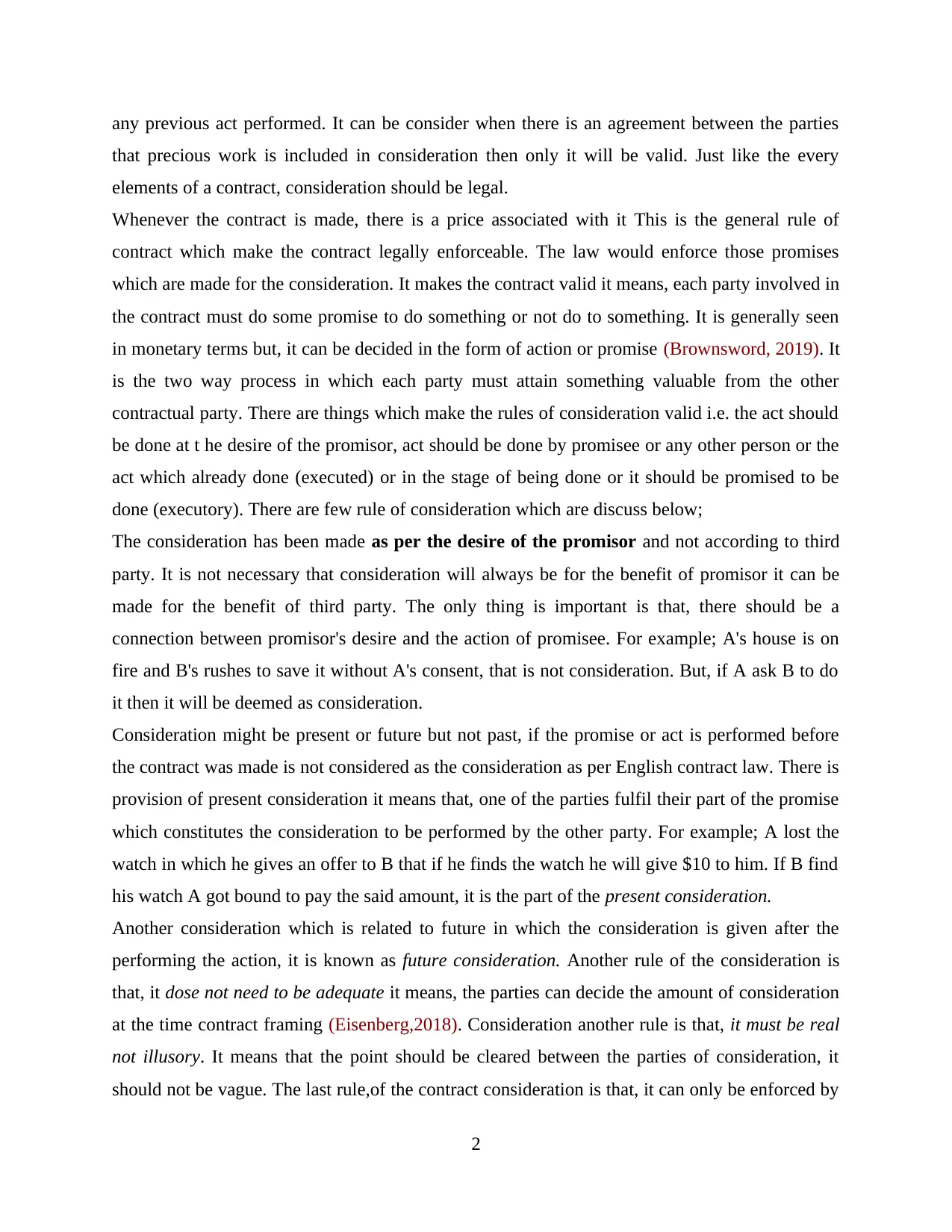
any previous act performed. It can be consider when there is an agreement between the parties
that precious work is included in consideration then only it will be valid. Just like the every
elements of a contract, consideration should be legal.
Whenever the contract is made, there is a price associated with it This is the general rule of
contract which make the contract legally enforceable. The law would enforce those promises
which are made for the consideration. It makes the contract valid it means, each party involved in
the contract must do some promise to do something or not do to something. It is generally seen
in monetary terms but, it can be decided in the form of action or promise (Brownsword, 2019). It
is the two way process in which each party must attain something valuable from the other
contractual party. There are things which make the rules of consideration valid i.e. the act should
be done at t he desire of the promisor, act should be done by promisee or any other person or the
act which already done (executed) or in the stage of being done or it should be promised to be
done (executory). There are few rule of consideration which are discuss below;
The consideration has been made as per the desire of the promisor and not according to third
party. It is not necessary that consideration will always be for the benefit of promisor it can be
made for the benefit of third party. The only thing is important is that, there should be a
connection between promisor's desire and the action of promisee. For example; A's house is on
fire and B's rushes to save it without A's consent, that is not consideration. But, if A ask B to do
it then it will be deemed as consideration.
Consideration might be present or future but not past, if the promise or act is performed before
the contract was made is not considered as the consideration as per English contract law. There is
provision of present consideration it means that, one of the parties fulfil their part of the promise
which constitutes the consideration to be performed by the other party. For example; A lost the
watch in which he gives an offer to B that if he finds the watch he will give $10 to him. If B find
his watch A got bound to pay the said amount, it is the part of the present consideration.
Another consideration which is related to future in which the consideration is given after the
performing the action, it is known as future consideration. Another rule of the consideration is
that, it dose not need to be adequate it means, the parties can decide the amount of consideration
at the time contract framing (Eisenberg,2018). Consideration another rule is that, it must be real
not illusory. It means that the point should be cleared between the parties of consideration, it
should not be vague. The last rule,of the contract consideration is that, it can only be enforced by
2
that precious work is included in consideration then only it will be valid. Just like the every
elements of a contract, consideration should be legal.
Whenever the contract is made, there is a price associated with it This is the general rule of
contract which make the contract legally enforceable. The law would enforce those promises
which are made for the consideration. It makes the contract valid it means, each party involved in
the contract must do some promise to do something or not do to something. It is generally seen
in monetary terms but, it can be decided in the form of action or promise (Brownsword, 2019). It
is the two way process in which each party must attain something valuable from the other
contractual party. There are things which make the rules of consideration valid i.e. the act should
be done at t he desire of the promisor, act should be done by promisee or any other person or the
act which already done (executed) or in the stage of being done or it should be promised to be
done (executory). There are few rule of consideration which are discuss below;
The consideration has been made as per the desire of the promisor and not according to third
party. It is not necessary that consideration will always be for the benefit of promisor it can be
made for the benefit of third party. The only thing is important is that, there should be a
connection between promisor's desire and the action of promisee. For example; A's house is on
fire and B's rushes to save it without A's consent, that is not consideration. But, if A ask B to do
it then it will be deemed as consideration.
Consideration might be present or future but not past, if the promise or act is performed before
the contract was made is not considered as the consideration as per English contract law. There is
provision of present consideration it means that, one of the parties fulfil their part of the promise
which constitutes the consideration to be performed by the other party. For example; A lost the
watch in which he gives an offer to B that if he finds the watch he will give $10 to him. If B find
his watch A got bound to pay the said amount, it is the part of the present consideration.
Another consideration which is related to future in which the consideration is given after the
performing the action, it is known as future consideration. Another rule of the consideration is
that, it dose not need to be adequate it means, the parties can decide the amount of consideration
at the time contract framing (Eisenberg,2018). Consideration another rule is that, it must be real
not illusory. It means that the point should be cleared between the parties of consideration, it
should not be vague. The last rule,of the contract consideration is that, it can only be enforced by
2
Paraphrase This Document
Need a fresh take? Get an instant paraphrase of this document with our AI Paraphraser
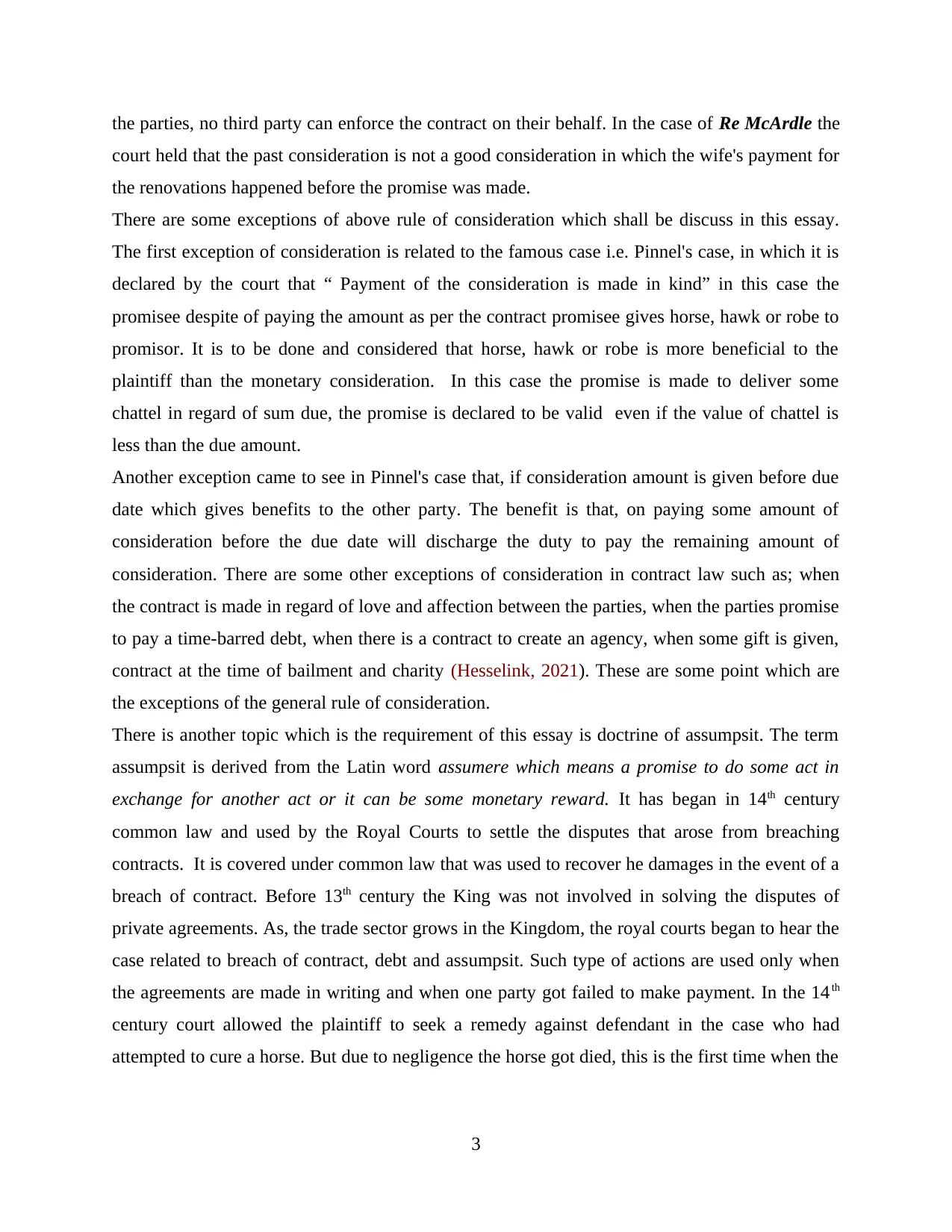
the parties, no third party can enforce the contract on their behalf. In the case of Re McArdle the
court held that the past consideration is not a good consideration in which the wife's payment for
the renovations happened before the promise was made.
There are some exceptions of above rule of consideration which shall be discuss in this essay.
The first exception of consideration is related to the famous case i.e. Pinnel's case, in which it is
declared by the court that “ Payment of the consideration is made in kind” in this case the
promisee despite of paying the amount as per the contract promisee gives horse, hawk or robe to
promisor. It is to be done and considered that horse, hawk or robe is more beneficial to the
plaintiff than the monetary consideration. In this case the promise is made to deliver some
chattel in regard of sum due, the promise is declared to be valid even if the value of chattel is
less than the due amount.
Another exception came to see in Pinnel's case that, if consideration amount is given before due
date which gives benefits to the other party. The benefit is that, on paying some amount of
consideration before the due date will discharge the duty to pay the remaining amount of
consideration. There are some other exceptions of consideration in contract law such as; when
the contract is made in regard of love and affection between the parties, when the parties promise
to pay a time-barred debt, when there is a contract to create an agency, when some gift is given,
contract at the time of bailment and charity (Hesselink, 2021). These are some point which are
the exceptions of the general rule of consideration.
There is another topic which is the requirement of this essay is doctrine of assumpsit. The term
assumpsit is derived from the Latin word assumere which means a promise to do some act in
exchange for another act or it can be some monetary reward. It has began in 14th century
common law and used by the Royal Courts to settle the disputes that arose from breaching
contracts. It is covered under common law that was used to recover he damages in the event of a
breach of contract. Before 13th century the King was not involved in solving the disputes of
private agreements. As, the trade sector grows in the Kingdom, the royal courts began to hear the
case related to breach of contract, debt and assumpsit. Such type of actions are used only when
the agreements are made in writing and when one party got failed to make payment. In the 14th
century court allowed the plaintiff to seek a remedy against defendant in the case who had
attempted to cure a horse. But due to negligence the horse got died, this is the first time when the
3
court held that the past consideration is not a good consideration in which the wife's payment for
the renovations happened before the promise was made.
There are some exceptions of above rule of consideration which shall be discuss in this essay.
The first exception of consideration is related to the famous case i.e. Pinnel's case, in which it is
declared by the court that “ Payment of the consideration is made in kind” in this case the
promisee despite of paying the amount as per the contract promisee gives horse, hawk or robe to
promisor. It is to be done and considered that horse, hawk or robe is more beneficial to the
plaintiff than the monetary consideration. In this case the promise is made to deliver some
chattel in regard of sum due, the promise is declared to be valid even if the value of chattel is
less than the due amount.
Another exception came to see in Pinnel's case that, if consideration amount is given before due
date which gives benefits to the other party. The benefit is that, on paying some amount of
consideration before the due date will discharge the duty to pay the remaining amount of
consideration. There are some other exceptions of consideration in contract law such as; when
the contract is made in regard of love and affection between the parties, when the parties promise
to pay a time-barred debt, when there is a contract to create an agency, when some gift is given,
contract at the time of bailment and charity (Hesselink, 2021). These are some point which are
the exceptions of the general rule of consideration.
There is another topic which is the requirement of this essay is doctrine of assumpsit. The term
assumpsit is derived from the Latin word assumere which means a promise to do some act in
exchange for another act or it can be some monetary reward. It has began in 14th century
common law and used by the Royal Courts to settle the disputes that arose from breaching
contracts. It is covered under common law that was used to recover he damages in the event of a
breach of contract. Before 13th century the King was not involved in solving the disputes of
private agreements. As, the trade sector grows in the Kingdom, the royal courts began to hear the
case related to breach of contract, debt and assumpsit. Such type of actions are used only when
the agreements are made in writing and when one party got failed to make payment. In the 14th
century court allowed the plaintiff to seek a remedy against defendant in the case who had
attempted to cure a horse. But due to negligence the horse got died, this is the first time when the
3
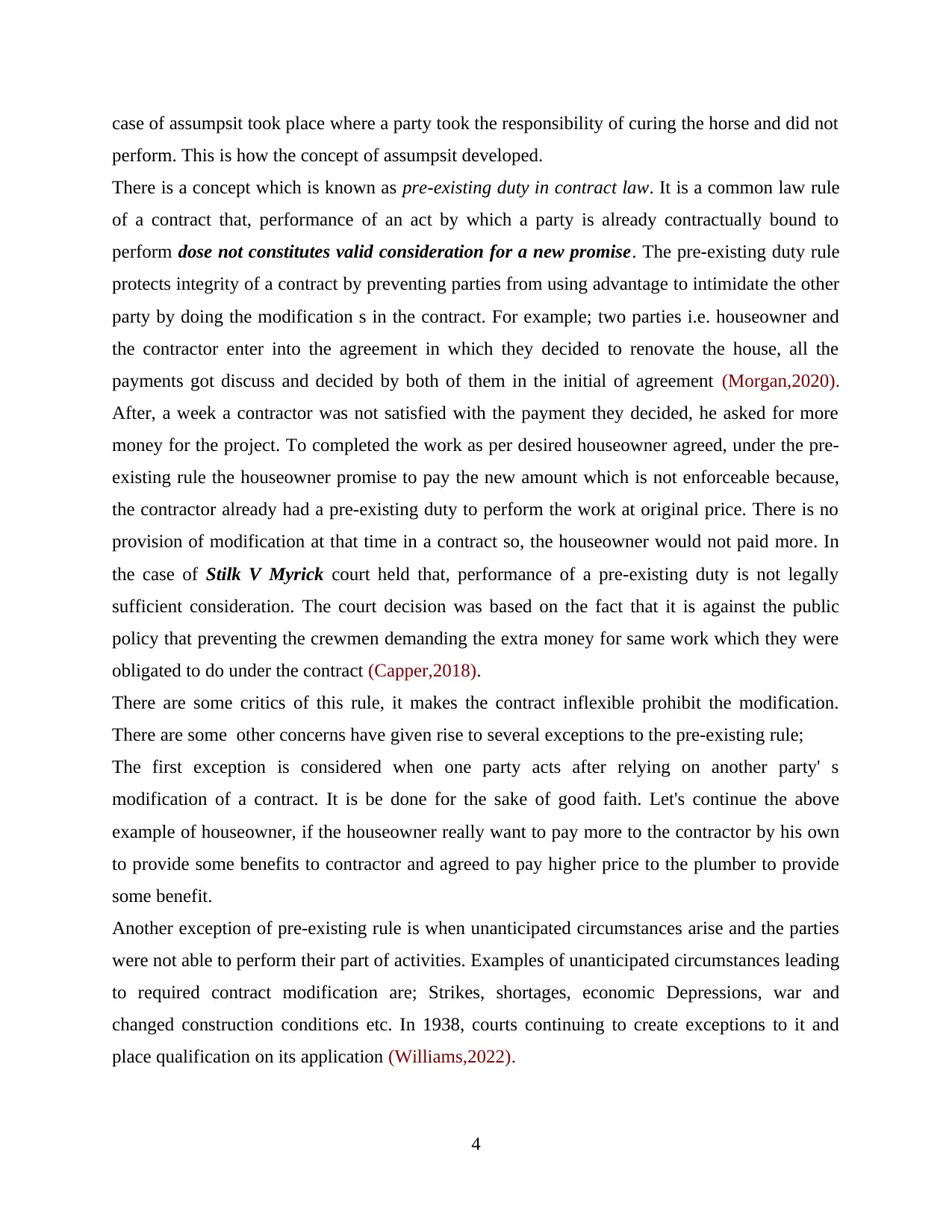
case of assumpsit took place where a party took the responsibility of curing the horse and did not
perform. This is how the concept of assumpsit developed.
There is a concept which is known as pre-existing duty in contract law. It is a common law rule
of a contract that, performance of an act by which a party is already contractually bound to
perform dose not constitutes valid consideration for a new promise. The pre-existing duty rule
protects integrity of a contract by preventing parties from using advantage to intimidate the other
party by doing the modification s in the contract. For example; two parties i.e. houseowner and
the contractor enter into the agreement in which they decided to renovate the house, all the
payments got discuss and decided by both of them in the initial of agreement (Morgan,2020).
After, a week a contractor was not satisfied with the payment they decided, he asked for more
money for the project. To completed the work as per desired houseowner agreed, under the pre-
existing rule the houseowner promise to pay the new amount which is not enforceable because,
the contractor already had a pre-existing duty to perform the work at original price. There is no
provision of modification at that time in a contract so, the houseowner would not paid more. In
the case of Stilk V Myrick court held that, performance of a pre-existing duty is not legally
sufficient consideration. The court decision was based on the fact that it is against the public
policy that preventing the crewmen demanding the extra money for same work which they were
obligated to do under the contract (Capper,2018).
There are some critics of this rule, it makes the contract inflexible prohibit the modification.
There are some other concerns have given rise to several exceptions to the pre-existing rule;
The first exception is considered when one party acts after relying on another party' s
modification of a contract. It is be done for the sake of good faith. Let's continue the above
example of houseowner, if the houseowner really want to pay more to the contractor by his own
to provide some benefits to contractor and agreed to pay higher price to the plumber to provide
some benefit.
Another exception of pre-existing rule is when unanticipated circumstances arise and the parties
were not able to perform their part of activities. Examples of unanticipated circumstances leading
to required contract modification are; Strikes, shortages, economic Depressions, war and
changed construction conditions etc. In 1938, courts continuing to create exceptions to it and
place qualification on its application (Williams,2022).
4
perform. This is how the concept of assumpsit developed.
There is a concept which is known as pre-existing duty in contract law. It is a common law rule
of a contract that, performance of an act by which a party is already contractually bound to
perform dose not constitutes valid consideration for a new promise. The pre-existing duty rule
protects integrity of a contract by preventing parties from using advantage to intimidate the other
party by doing the modification s in the contract. For example; two parties i.e. houseowner and
the contractor enter into the agreement in which they decided to renovate the house, all the
payments got discuss and decided by both of them in the initial of agreement (Morgan,2020).
After, a week a contractor was not satisfied with the payment they decided, he asked for more
money for the project. To completed the work as per desired houseowner agreed, under the pre-
existing rule the houseowner promise to pay the new amount which is not enforceable because,
the contractor already had a pre-existing duty to perform the work at original price. There is no
provision of modification at that time in a contract so, the houseowner would not paid more. In
the case of Stilk V Myrick court held that, performance of a pre-existing duty is not legally
sufficient consideration. The court decision was based on the fact that it is against the public
policy that preventing the crewmen demanding the extra money for same work which they were
obligated to do under the contract (Capper,2018).
There are some critics of this rule, it makes the contract inflexible prohibit the modification.
There are some other concerns have given rise to several exceptions to the pre-existing rule;
The first exception is considered when one party acts after relying on another party' s
modification of a contract. It is be done for the sake of good faith. Let's continue the above
example of houseowner, if the houseowner really want to pay more to the contractor by his own
to provide some benefits to contractor and agreed to pay higher price to the plumber to provide
some benefit.
Another exception of pre-existing rule is when unanticipated circumstances arise and the parties
were not able to perform their part of activities. Examples of unanticipated circumstances leading
to required contract modification are; Strikes, shortages, economic Depressions, war and
changed construction conditions etc. In 1938, courts continuing to create exceptions to it and
place qualification on its application (Williams,2022).
4
⊘ This is a preview!⊘
Do you want full access?
Subscribe today to unlock all pages.

Trusted by 1+ million students worldwide
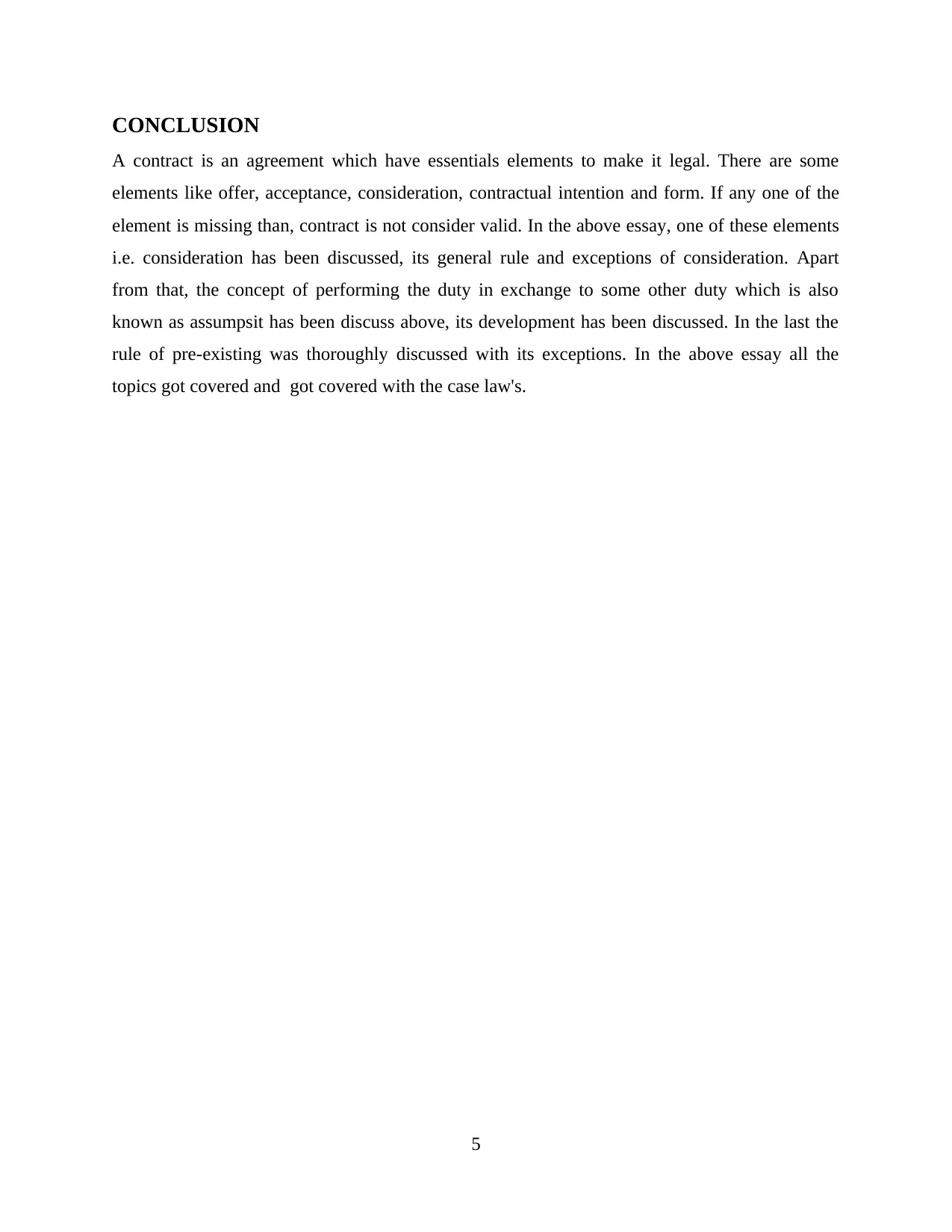
CONCLUSION
A contract is an agreement which have essentials elements to make it legal. There are some
elements like offer, acceptance, consideration, contractual intention and form. If any one of the
element is missing than, contract is not consider valid. In the above essay, one of these elements
i.e. consideration has been discussed, its general rule and exceptions of consideration. Apart
from that, the concept of performing the duty in exchange to some other duty which is also
known as assumpsit has been discuss above, its development has been discussed. In the last the
rule of pre-existing was thoroughly discussed with its exceptions. In the above essay all the
topics got covered and got covered with the case law's.
5
A contract is an agreement which have essentials elements to make it legal. There are some
elements like offer, acceptance, consideration, contractual intention and form. If any one of the
element is missing than, contract is not consider valid. In the above essay, one of these elements
i.e. consideration has been discussed, its general rule and exceptions of consideration. Apart
from that, the concept of performing the duty in exchange to some other duty which is also
known as assumpsit has been discuss above, its development has been discussed. In the last the
rule of pre-existing was thoroughly discussed with its exceptions. In the above essay all the
topics got covered and got covered with the case law's.
5
Paraphrase This Document
Need a fresh take? Get an instant paraphrase of this document with our AI Paraphraser
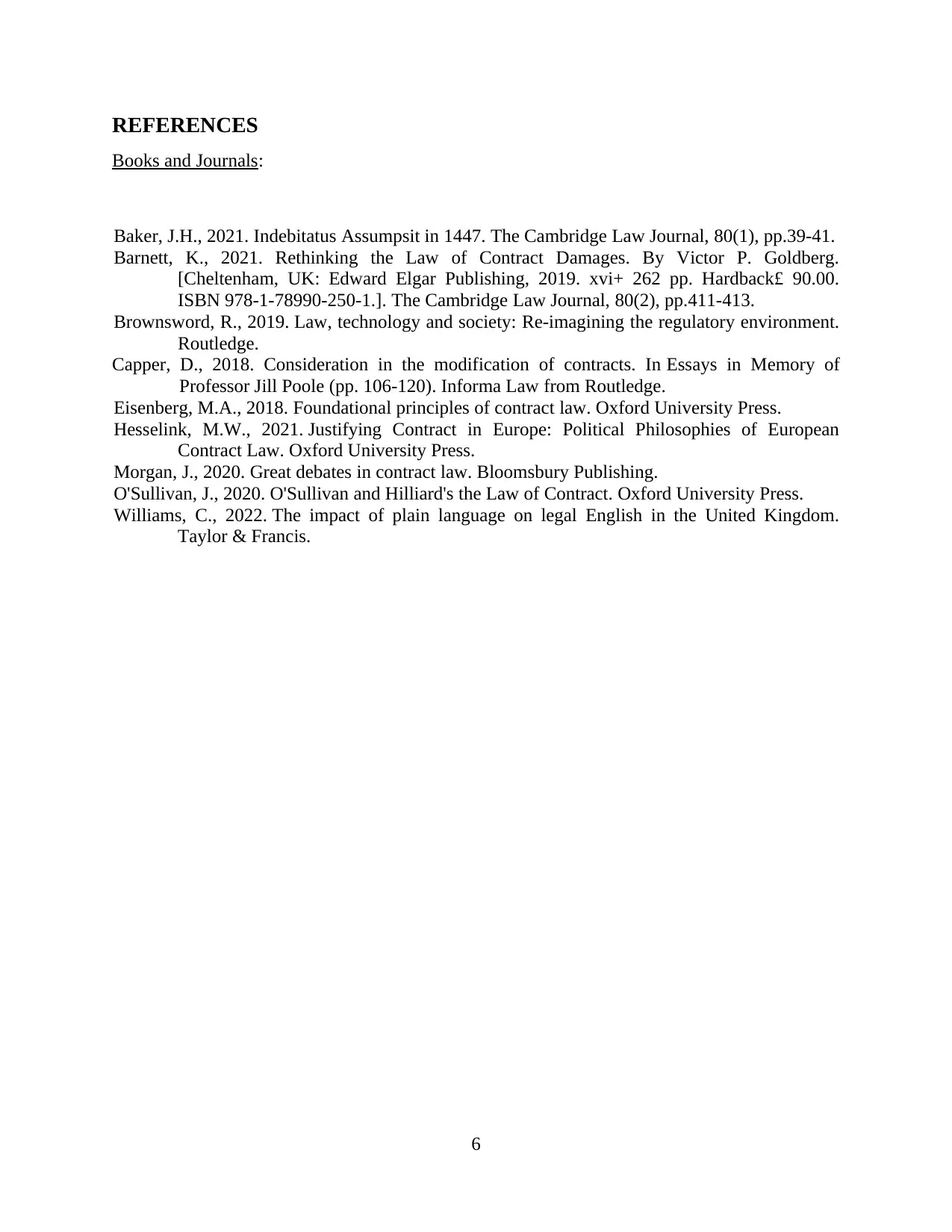
REFERENCES
Books and Journals:
Baker, J.H., 2021. Indebitatus Assumpsit in 1447. The Cambridge Law Journal, 80(1), pp.39-41.
Barnett, K., 2021. Rethinking the Law of Contract Damages. By Victor P. Goldberg.
[Cheltenham, UK: Edward Elgar Publishing, 2019. xvi+ 262 pp. Hardback£ 90.00.
ISBN 978-1-78990-250-1.]. The Cambridge Law Journal, 80(2), pp.411-413.
Brownsword, R., 2019. Law, technology and society: Re-imagining the regulatory environment.
Routledge.
Capper, D., 2018. Consideration in the modification of contracts. In Essays in Memory of
Professor Jill Poole (pp. 106-120). Informa Law from Routledge.
Eisenberg, M.A., 2018. Foundational principles of contract law. Oxford University Press.
Hesselink, M.W., 2021. Justifying Contract in Europe: Political Philosophies of European
Contract Law. Oxford University Press.
Morgan, J., 2020. Great debates in contract law. Bloomsbury Publishing.
O'Sullivan, J., 2020. O'Sullivan and Hilliard's the Law of Contract. Oxford University Press.
Williams, C., 2022. The impact of plain language on legal English in the United Kingdom.
Taylor & Francis.
6
Books and Journals:
Baker, J.H., 2021. Indebitatus Assumpsit in 1447. The Cambridge Law Journal, 80(1), pp.39-41.
Barnett, K., 2021. Rethinking the Law of Contract Damages. By Victor P. Goldberg.
[Cheltenham, UK: Edward Elgar Publishing, 2019. xvi+ 262 pp. Hardback£ 90.00.
ISBN 978-1-78990-250-1.]. The Cambridge Law Journal, 80(2), pp.411-413.
Brownsword, R., 2019. Law, technology and society: Re-imagining the regulatory environment.
Routledge.
Capper, D., 2018. Consideration in the modification of contracts. In Essays in Memory of
Professor Jill Poole (pp. 106-120). Informa Law from Routledge.
Eisenberg, M.A., 2018. Foundational principles of contract law. Oxford University Press.
Hesselink, M.W., 2021. Justifying Contract in Europe: Political Philosophies of European
Contract Law. Oxford University Press.
Morgan, J., 2020. Great debates in contract law. Bloomsbury Publishing.
O'Sullivan, J., 2020. O'Sullivan and Hilliard's the Law of Contract. Oxford University Press.
Williams, C., 2022. The impact of plain language on legal English in the United Kingdom.
Taylor & Francis.
6
1 out of 8
Related Documents
Your All-in-One AI-Powered Toolkit for Academic Success.
+13062052269
info@desklib.com
Available 24*7 on WhatsApp / Email
![[object Object]](/_next/static/media/star-bottom.7253800d.svg)
Unlock your academic potential
Copyright © 2020–2026 A2Z Services. All Rights Reserved. Developed and managed by ZUCOL.




